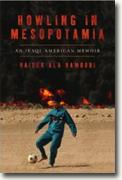Howling in Mesopotamia
Haider Ala Hamoudi
book reviews:
· general fiction
· chick lit/romance
· sci-fi/fantasy
· graphic novels
· nonfiction
· audio books
· author interviews
· children's books @
curledupkids.com
· DVD reviews @
curledupdvd.com
newsletter
win books
buy online
links
home
for authors
& publishers
for reviewers

 |
Howling in Mesopotamia: An Iraqi-American Memoir Haider Ala Hamoudi Beaufort Books Hardcover 273 pages April 2008 |
|
When Haider Ala Hamoudi, the American-born child of Iraqi parents, decided to return to his ancestral home in 2003, he hoped to remain in Iraq forever. His plan was to reconnect with his family and culture, to help rebuild the country, and to make a lot of money. His arrival at the American-occupied Baghdad Airport might be a metaphor for what happened next: “…the plane reaches the airport runway without descending at all, and then initiates a rapid spiral descent toward the airstrip, which seems to resemble free-fall.”In much the same way, the country approached a new era with hopes of freedom and a better life for its citizens only to spiral downward into increasing chaos and fear.
As much as he respects and loves this country, Hamoudi is still American born and bred. So which culture does he claim as his own? “You might as well ask me if I am my mother’s child or my father’s.” In some sense, he is a stranger in both worlds, but that same outsider status makes it possible for him to reveal the heart and soul of both cultures, the underlying and seemingly irresolvable differences. His family is Shi’i, a majority group in Iraq that has suffered subjugation and discrimination by various groups for centuries, most recently by Saddam Hussein’s Ba’ath regime. Shortly after arrival, Hamoudi visits the city of Najaf, “the place where Iraqi Shi’is bury their dead.” Many of Hamoudi’s relatives are buried in this place, but “What was most striking…” he tells us, as if he can barely take it in, “were the premature dates of death of the males buried in nearly all Najaf family tombs in the last twenty-five years.” Hamoudi’s paternal grandmother gave birth to fourteen children of whom only four remain alive and in Iraq. Of those four, one was imprisoned and tortured by the Ba’ath and another received the corpse of her youngest child seven years after he was abducted by Saddam’s security forces. He, too, is buried in Najaf. This early episode ought to be the most gut-wrenching scene in the book, but unfortunately it is only a precursor to the unfolding story of despair and disintegration in post-Saddam Iraq. Frazzled and frightened American soldiers often present as great a threat to Iraqi citizens as the fallen regime. Pro-Saddam insurgents regularly bomb the cities and murder innocent bystanders. Crushed between these two armed and dangerous forces are the ordinary people who have grown used to violence, lack of basic necessities, and the constant shadow of death. Many, perhaps most, Iraqis loathed and fear Saddam Hussein, and after his capture they dared to believe that safety and freedom really were possible, but that hope is chipped away daily. Governments spout high-minded rhetoric - ‘A Free Iraq for a Free People’ and ‘The Rule of Law Is the Responsibility of the Iraqi People.’ By contrast, the graffiti of the people addresses the more pressing concerns – ‘Where is our gasoline?’ Day by day, Hamoudi’s vision of a healed and thriving Iraq erodes as well. After a year in the country, he feels compelled to announce to his family, “The war is over…America has lost Iraq.” The tense but optimistic people he encountered upon arrival have grown into a demoralized nation under siege. Hamoudi writes with a clean, crisp, just-the-facts style that packs more punch than any flowery prose could approach. Poor copy editing is a minor distraction, but the power of Hamoudi’s words and his short, sharp scenes make Howling in Mesopotamia Originally published on Curled Up With A Good Book at www.curledup.com. © Deborah Adams, 2008 |
|
|
|
 Click here to learn more about this month's sponsor! |
|
| fiction · sf/f · comic books · nonfiction · audio newsletter · free book contest · buy books online review index · links · · authors & publishers reviewers |
|
| site by ELBO Computing Resources, Inc. | |
 American soldiers welcome Hamoudi “home” and ask if most Iraqis like them - “They on our side or not?” The assumption, of course, is that Hamoudi is Iraqi and that all Iraqis are alike. But annual visits to the country do not an Iraqi make, and Hamoudi admits, “The question surprised and embarrassed me. The fact of the matter is that I really did not know.”
American soldiers welcome Hamoudi “home” and ask if most Iraqis like them - “They on our side or not?” The assumption, of course, is that Hamoudi is Iraqi and that all Iraqis are alike. But annual visits to the country do not an Iraqi make, and Hamoudi admits, “The question surprised and embarrassed me. The fact of the matter is that I really did not know.”